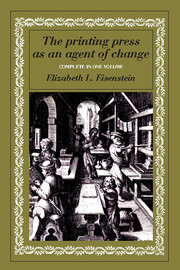Book contents
- Frontmatter
- Dedication
- Contents
- Preface
- Part One Introduction to an Elusive Transformation
- Part Two Classical and Christian Traditions Reoriented; Renaissance and Reformation Reappraised
- Part Three The Book of Nature Transformed
- 5 Introduction; problems of periodization
- 6 Technical literature goes to press: some new trends in scientific writing and research
- 7 Resetting the stage for the Copernican Revolution
- 8 Sponsorship and censorship of scientific publication
- Conclusion: Scripture and nature transformed
- Bibliographical index
- General index
8 - Sponsorship and censorship of scientific publication
Published online by Cambridge University Press: 05 September 2013
- Frontmatter
- Dedication
- Contents
- Preface
- Part One Introduction to an Elusive Transformation
- Part Two Classical and Christian Traditions Reoriented; Renaissance and Reformation Reappraised
- Part Three The Book of Nature Transformed
- 5 Introduction; problems of periodization
- 6 Technical literature goes to press: some new trends in scientific writing and research
- 7 Resetting the stage for the Copernican Revolution
- 8 Sponsorship and censorship of scientific publication
- Conclusion: Scripture and nature transformed
- Bibliographical index
- General index
Summary
INTRODUCTION
This chapter serves as a companion piece to the previous one. There I argued for the need to reset the stage for the Copernican Revolution. Here I will employ a similar approach to Galileo's trial. There will be no attempt at detailed coverage of the episode itself or at a comprehensive survey of all the issues it raised. My main purpose in dealing with the trial is to show that the problem of access to publication outlets was a pivotal issue – one that has been unduly neglected and needs to be given more weight. I also hope to show how this same issue enters into other related problems and provides a kind of missing link between episodes on battlefields and adventures in ideas. In the following discussion, special consideration will be given to two interrelated problems.
First, there is the problem of connections between the Reformation and early-modern science. Second, there is the relevance of external social institutions to the internal, relatively autonomous, life of science. By bringing out the significance of the role of publication, I hope to suggest a fresh approach to both problems. I hope, that is, to throw some new light on connections between Protestants and scientists, and also to suggest how the external regulation of the book-trade impinged on scientific theories and creative acts.
- Type
- Chapter
- Information
- The Printing Press as an Agent of Change , pp. 636 - 682Publisher: Cambridge University PressPrint publication year: 1980



